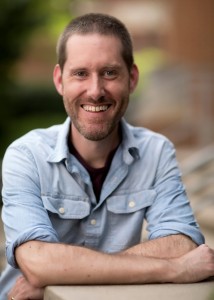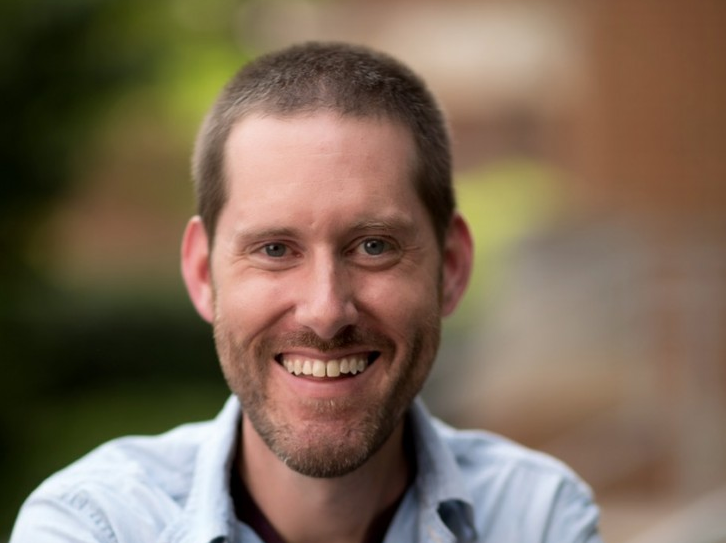
Josh Hall, Director of Science Outreach and UNC PREP at the University of North Carolina School of Medicine, Director of North Carolina DNA Day, and creator/co-host of “Hello PhD: a podcast for scientists and the people who love them.”
Most grad students and postdocs struggle with where their training will take them as they complete each phase of their career development. After discussions with individuals in the scientific community, I’ve learned that many successful scientists followed a career path that allows them to work in areas they are truly passionate about. Questioning where we fit best and recognizing our personal strengths is critical to our career development. For Dr. Joshua Hall of the University of North Carolina School of Medicine, this self-awareness was the key in recognizing that a career away from the bench was the best fit for him.
Josh began assessing his career options while in graduate school, but still pursued a traditional postdoctoral position where he applied his research skills to a new set of questions. At the same time, he received an Institutional Research and Academic Career Development Awards (IRACDA) Fellowship, allowing him to gain valuable experience in teaching. During his postdoc, he became decreasingly motivated by bench work and realized that what he really enjoyed was mentoring students and helping them chart out their own careers. He identified that his strength was his ability to guide others toward achieving their goals, be that through one-on-one guidance or larger communication forums.
But how does someone build a career centered on mentoring? And perhaps equally important, what’s the best way step off of the research career track gracefully?
Well, Josh acknowledges that it is a challenge to make the decision to move away from the bench. “The sense that you are setting your long held career goals aside is scary,” said Josh. He also encountered little support from his mentors. In many conversations, when he asked for support he instead got comments trying to persuade him to stay in academia. He often heard, “you’ve got what it takes to be a faculty member, so you should pursue that.”
Josh is an excellent example of why we cannot continue to have the same discouraging conversations about long term career options for trainees. There is a very large and complex scientific enterprise that requires a multitude of interests, strengths, and talents. We cannot continue guiding the bulk of trainees towards tenure track academic research positions; especially since those positions will not fit every individual’s motivation and personal drive. If the majority of students and postdocs are prepared only for tenure-track faculty jobs, it places a large burden on trainees as well as the research community. Like Josh, each trainee can make a substantial impact on the research landscape by pursuing careers that specifically fit their strengths and talents.
Josh’s decision to step away from the bench has had a positive influence on the scientific community, particularly among the trainees that have worked with him directly, myself included. Currently, Josh is the Director of Science Outreach and UNC PREP in the Office of Graduate Education at the University of North Carolina School of Medicine. For the past six years, he has also served as Director of North Carolina DNA Day, an outreach program that connects scientists with high school classrooms. In this role, he and his colleagues at UNC work to facilitate opportunities for graduate students and postdocs to gain skills and sculpt careers both inside and outside of the lab. These opportunities involve improving career awareness, communication skills, opportunities for teaching and outreach, and bringing students with similar career interests together. More importantly, they work to teach early-career scientists that PhD training leads to an outstanding ability to solve problems and ask questions, something that is broadly applicable to numerous career options. Josh and his colleagues help trainees recognize that career paths are often not straight lines, and that a PhD provides the keys to unlock a wide array of doors along the career path. While careers away from the bench may not have as clear a path as the one for tenure track faculty, this also means that there are ample opportunities to carve out a unique position. The key to building a successful career away from the bench, according to Josh, is to “self-reflect and figure out where your skills and passions lie, ask for help when you need it, and don’t be afraid to try something new.”
Indeed, Josh is not afraid of new challenges. The experiences in his current position have made him realize that many of the issues graduate students and postdocs are having now are the same as those he had when he was in training. Because of this, he created and co-hosts a podcast, “Hello PhD: a podcast for scientists and the people who love them,” in order to broaden the reach of his mentoring. Here, he works with his long-time friend from graduate school, Daniel Arneman, to broaden the discussion about important issues surrounding the PhD experience. The podcast is a venue to discuss topics that are important for grad students and postdocs with an aim to form a community to talk about the shared experiences and challenges related to scientific training. “If the podcast makes the science training experience better for just one person, then we will consider that a success,” Josh says. Perhaps this serves as the best example of how to build a satisfying career: first, you recognize your strength as an individual. Then, you identify a need or something that needs to be improved. Finally, you take the leap and build your part in the future of the scientific community.
These conversations about career options, whether they take place on a podcast or in the laboratory, during a winter hike or in a blog post, are important for the continued strengthening and growth of our community. To continue to progress the research enterprise, it will take the collective creativity of a diverse group of trainees and mentors working to build a highly skilled workforce. And the skills that are needed are not going to be found only at the bench. They will be found leading initiatives to increase support for funding, communicating the importance of fundamental discoveries, and teaching the next generation of great scientists.
Connect with Josh:
Twitter: @jdhallphd
LinkedIn: https://www.linkedin.com/in/jdhall
Hello PhD Twitter: @hellophd































